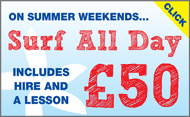
Introduction
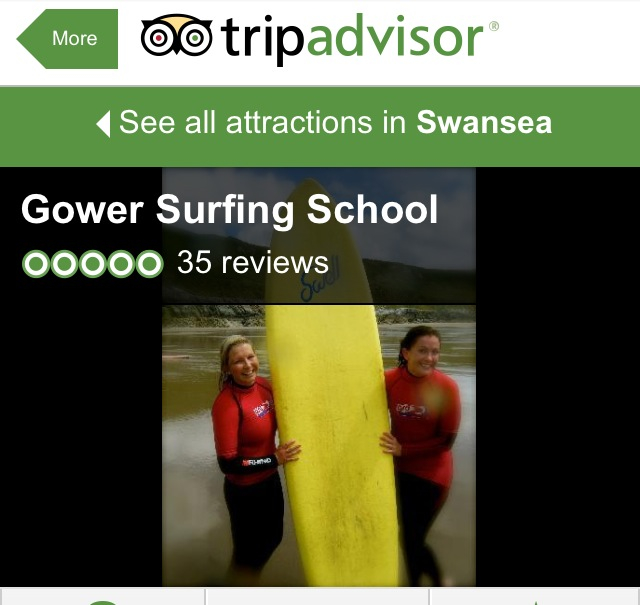
Tripadvisor Gower Surfing School
One of many quotes from our customers after their first surfing experience here on Gower.
“Amazing Experience!”
Reviewed 24 October 2013
This was the first time I've ever surfed in my life. The staff was of an enormous help and with a few tips & tricks I soon rode my first wave! :D
Visited October 2013
Coming surfing on Gower or just visiting Swansea? Places to stay are abundant with options of holiday cottage rentals, camping or hotels and B & B's. We can point you in the right direction as regards hotels etc
If you are coming camping on Gower then how about using the service of ' Pitch My Tent ' they do it all for you so no need to bring a tent or sleeping bags.. You can book via there website please mention you found them through us.
New for 2014 is the introduction of SUP taster lessons here on Gower via the 360 centre Swansea Bay, all equipment included.
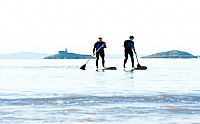
Visit Swansea Bay, and enjoy a fantastic break away, surfing, swimming, walking. For great holiday accommodation HomeAway have a great variety of properties to suit all tastes and budgets.
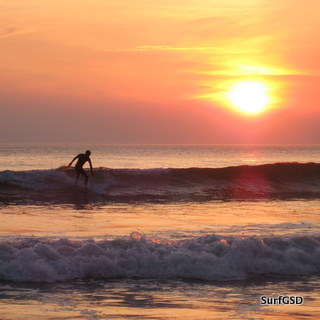
Picture above was taken during one of our late sunset surfing sessions at Rhossili beach on Glorious Gower
In the region we are the only licensed surf school by The City & County of Swansea.
Operates all year round at Caswell Bay, Swansea and during the summer months at Rhossili Bay on Gower. We provide all the surfing equipment you will need for free and we cater for everyone. Our surf coaches have a wide range of experience in coaching peopleand young people from all walks of life from premier league football players/British Lion rugby players to young people on a pathways project. Surfing is for everyone and a great way to break barriers, build confidence and get fit at the same time.
Gower Surfing is accepted to be one of the leading surf course providers in the UK.
Near by is Swansea City, home to the premier league football team and also top flight rugby team the Ospreys only 15 minutes away from the surfing beach of Caswell Bay. The nightlife in Wind street, the uplands and SA1 areas are great for stag, hen and those that want a fun night out ending up in a cool night club like the monkey bay. If Swansea is not your thing then how about camping or staying in a fishermans cottage in Mumbles village or on glorious Gower? We can help you with finding places to stay just ask when you contact the surf school.
Gower Surfing by Simon Jayham for Visit Wales magazine.
Over 20 years ago I pulled up in to the Wormshead hotel car park, Rhossili overlookiing three miles of beach and perfect waves rolling in groomed by light offshore winds. It was early in the morning and no one around, so I pulled on my wetsuit and ran down the steps to the beach entranced by the scenery.
The adrenalin rushing and my mind shouting.. 'he was right..he was right.' Who was right? Previous to my trip to Gower I had spent years traveling around the world in search of perfect empty waves and a fellow surfer in a hostel had shown me pictures of waves and pointed them out here in Wales. 'He was right!!, there are waves in Wales, more than that, there are still empty waves!
I have spent the last 20 years surfing here on Gower and traveling abroad. I have yet to re-live that self actualisation of finding a spot with perfect waves all to myself. Perhaps one day I will repeat that past experience. I feel I must confess to being a surf, travel addict, as the saying goes, 'only a surfer knows the feeling..'
Live, Surf and Travel
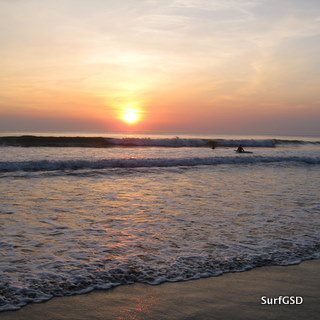
Shopgsd the online surf shop our popular surfing shop offer is : Buy a surfboard from us and we will give you a surf lesson free or go one step further and have a 1-2-1 surf session for only £20 saving £80 on the normal price! We want to sell you a surfboard yes, but we also want to make sure you can surf it too.
SurfGSD – the British surf company welcomes you to our online surf shop selling surfing gift vouchers, learn to surf lessons, stag and hen surfing weekends and surfing holiday packages including cool camping or city hotel breaks. Parents can pay online for our famous Junior Surfing Lessons held at Caswell Bay, Swansea.
Tips for those taking up surfing
Some Basic Points For Beginners
Surfing can be a demanding sport and you should be reasonably fit and able to swim at least 50 metres in open water. Ideally before planning a surfing trip it is advisable to carry out a programme of exercises spread over the course of a couple of weeks.
Running, Cycling and especially Swimming will help improve your stamina and will help tone up the all important paddling muscles. Experience in bathing at surf beaches is advantageous as it will help you develop an awareness of the behaviour of waves.
Always remember to carry out a warm up before going surfing and before carrying out any type of training.
Equipment
Only use or hire soft foam boards on your first time all British surf schools are required to use 100 % foam safe boards. They are also super fun to use after you have had your surfing lesson they can be purchased here safe soft surfboards Surfboards
Beginners need larger than average boards (at least 12 inches- 300 mm longer than they are tall) and all boards need a suitable surf leash. Soft skinned surfboards are ideal for learning to surf. For next step surfboards check these links Circle one surfboards or starter surfboards
Wetsuits
A one piece wetsuit, either a full suit or shorty (short arms and short legs), is a must for surfing in Britain. A 3/2 mm double lined suit is adequate for summer use however a 4/3 mm is best if you intend to surf in the Spring and Autumn.
Paddling Out
Before paddling out always watch other surfers to see where best to enter the water. Ask the advice of lifeguards or experienced surfers to find out if there are any dangers you should be aware of. To paddle the board, lie prone on it - length wise, with the nose of the board just above the surface of the water. Use your arms as paddles either side of the board (using the crawl swimming stroke) and practice paddling to find the technique best suited to your needs.
Taking Off
Study the pattern of the waves before deciding how far out to paddle. Make sure you are not directly lined up with another surfer or swimmer and then get into position facing the beach. When a suitable wave is about 5 metres from you check there are no other surfers on it and start paddling. As the wave reaches you it lifts the board and, if you are paddling fast enough, the wave propels you forward. Take hold of the rails and jump straight to your feet
Your front foot should be about half way up the board with your rear foot about 24 inches (600 mm) behind it. Your back foot should be at approximately right angles to the centre of the board, your front foot at 45 degrees. Make sure all the time that the nose of the board is above the water, not too far up or you will fall back into the wave, and not too far down or the board will nose dive.
The best place to learn how to catch waves and to stand up is in the white water whilst being instructed by a British NGB qualified coach.
Riding a Wave
Once you have mastered standing up in one movement the next step is to keep ahead of the breaking part of the wave by manoeuvring (turning) away from the white water. This is done by putting more of your weight on your back foot whilst leaning in the direction you wish to go whilst making sure that the nose of the board remains above water level. Turning the surfboard is a key skill as it is an essential requirement for avoiding collisions with other surfers and swimmers.
Always watch out for other surfers and swimmers etc. and do not keep your eyes fixed on the board (or on your feet) - keep your head up and look ahead.
Leaving the Wave
You may surf all the way to the shore or stop the ride intentionally because you are running out of wave, or for other reasons such as to avoid a collision. The technique is the same as for turning and you can stop quickly by turning sharply back into the wave, or over it. This is done by moving your weight back as far as possible on the board to enable you to achieve a strong swivel movement. In slow shore-break surf, the board can be stopped by stepping to the rear of the board and allowing the wave to overtake. DO NOT KICK YOUR BOARD OUT OR JUST JUMP OFF IT !!!
Controlling your Board
It is vital that you are in control of your board at all times and that you do not let the surfboard control you. Full control is essential for proper surfing and to achieve this you should practice in stages. Do not go out too far to start with and select the smaller inside waves on which to perfect your technique. All learners should start in white water, but all should get outside and catch unbroken waves as soon as possible.
Perfecting Techniques
After the basic techniques of paddling, catching, riding and leaving a wave have been mastered improvements and refinements can be made. Help and advice from more experienced surfers or from a BSA Accredited Surf Coach will be very useful as will joining a surf club is an advantage and reading books and surfing magazines.
Leashes and Insurance
A surf leash (approx. 6’ (1.8m) long) securing the surfboard to your ankle should be used at all times. Leashes prevent loose boards from getting out of control and possibly injuring people, they also mean that your board (a safety aid) remains with you at all times. You should never surf without Third Party Insurance Cover, which in any case is mandatory in some areas. Public Liability Insurance is included in membership of British Surfing and covers you for claims of up to £2,000,000 anywhere in the World. Only enter water if the waves are of a safe size. (Below 1.5 meters)
Check with the water safety team first. Put leash on at waters edge and take off when you leave the water.
When you fall off your board, make sure you FALL FLAT do not dive off!!!
When you surface you must COVER YOUR HEAD with both arms.
If you ride the wave all the way to the shallows simply step off your board and do not jump off. In the summer months wear wetsuit boots at Llangenith beach, especially at low water due to weaver fish stings.
Keep an eye on your surfing location; keep in front of a fixed point on the beach. This will stop you from drifting.
DO NOT SURF @ LANGLAND BEACH.
DO NOT SURF BETWEEN RED AND YELLOW FLAGS.
One person one wave, if you are paddling for a wave and another surfer is on it leave it go and wait for another as dropping in can cause problems.
DUTY OF CARE, you are responsible for your actions with the surfboard in the ocean therefore keep control of it at all times. INFO PROVIDED BY Simon Jayham Director of Gower Surfing and Colin Wilson Ex-Director of the British Surfing Association.
Latest News
Surf GSD, based on the Gower Peninsula has been praised in The Independent's list of '50 Best Spring Days Out.
Writer Rhiannon Batten recommended catching a wave with Surf GSD on Gower link here > Independent Best spring days
Gower surf school wins top blog award
Well done to local surf school SurfGSD for winning Tripbase 2011 Blog Award link here for more information > Visit SwanseaBay
Surf GSD featured on BBC Wales for our work with young people from the autism spectrum at Caswell Beach, Swansea and indoors at the LC Swansea. The video filmed last August is here >Surfing lessons at Caswell beach, Swansea





